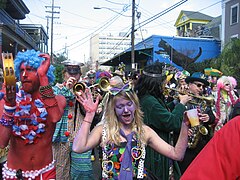
Back ماردي جرا Arabic Mardi Gras BCL Meurlarjez Breton Dimarts de Carnaval Catalan Mardi Gras Czech Mardi Gras Welsh Mardi Gras German Λιπαρή Τρίτη Greek Mardi Gras (Martes de Carnaval) Spanish Astearte inautea Basque
| Mardi Gras | |
|---|---|
 Celebrations in New Orleans, Louisiana, U.S. | |
| Also called | Fat Tuesday, Shrove Tuesday, Pancake Tuesday |
| Type | Christian, Cultural |
| Significance | Celebration period before fasting season of Lent |
| Celebrations | Parades, parties |
| Date | Day before Ash Wednesday, 47 days before Easter, 2 days after Shrove Sunday |
| 2024 date | February 13 |
| 2025 date | March 4 |
| 2026 date | February 17 |
| 2027 date | February 9 |
| Frequency | Annual |
| Related to | Shrove Tuesday, Carnival, Shrove Monday, Pre-Lent, Ash Wednesday, Lent, Užgavėnės, Maslenitsa, |
Mardi Gras (UK: /ˌmɑːrdi ˈɡrɑː/, US: /ˈmɑːrdi ɡrɑː/;[1][2] also known as Shrove Tuesday) is the final day of Carnival (also known as Shrovetide or Fastelavn); it thus falls on the day before the beginning of Lent on Ash Wednesday.[3] Mardi Gras is French for "Fat Tuesday", reflecting the practice of the last night of consuming rich, fatty foods in preparation for the Christian fasting season of Lent, during which the consumption of such foods is avoided.[4]
Related popular practices are associated with Carnival celebrations before the fasting and religious obligations associated with the penitential season of Lent. In countries such as the United Kingdom, Mardi Gras is more usually known as Pancake Day or (traditionally) Shrove Tuesday, derived from the word shrive, meaning "to administer the sacrament of confession to; to absolve".[5]
- ^ Wells, John C. (2008). Longman Pronunciation Dictionary (3rd ed.). Longman. ISBN 978-1-4058-8118-0.
- ^ Jones, Daniel (2011). Roach, Peter; Setter, Jane; Esling, John (eds.). Cambridge English Pronouncing Dictionary (18th ed.). Cambridge University Press. ISBN 978-0-521-15255-6.
- ^ "Mardi Gras (n.)". Oxford English Dictionary (Online ed.). Oxford University Press. doi:10.1093/OED/9489225210. (Subscription or participating institution membership required.)
- ^ Cite error: The named reference
Rose1995was invoked but never defined (see the help page). - ^ Melitta Weiss Adamson, Francine Segan (2008). Entertaining from Ancient Rome to the Super Bowl. ABC-CLIO. ISBN 9780313086892.
In Anglican countries, Mardis Gras is known as Shrove Tuesday—from shrive meaning "confess"—or Pancake Day—after the breakfast food that symbolizes one final hearty meal of eggs, butter, milk and sugar before the fast. On Ash Wednesday, the morning after Mardi Gras, repentant Christians return to church to receive upon the forehead the sign of the cross in ashes.